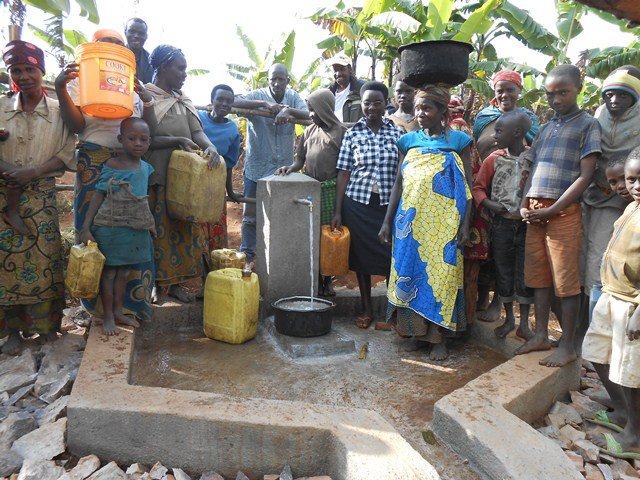The Gift of Awareness and Spreading Hope
The Gazelle Foundation is constantly impressed and inspired by personal stories from donors and supporters. Copeland Doctor—business owner, student, and volunteer—has recently become a supporter of the Foundation’s mission in Burundi, and we hope his experience might motivate others.
Copeland is 22 years old and calls himself an “Iowa-born Texan” spending most of his years growing up in the hill country. Copeland owns and operates a concrete pressure washing and cleaning service business, and also hosts a podcast called Think Pray Do. In addition to running his business, Copeland is working towards a nonaccredited associate degree at Charis bible college and is an active member of Northpoint church in New Braunfels, Texas. His favorite things to do in his spare time are sailing, bouldering, and horseback riding.
How did you learn about the Gazelle Foundation?
I first heard of the Gazelle Foundation from one of my pastors at church. The congregation I attend has a 13-year relationship with Burundi and some of its remarkable inhabitants, so when I inquired about an organization that helped with drilling freshwater wells for charity, I was referred to the Gazelle Foundation. I quickly learned the Gazelle Foundation does not drill wells, but the more I researched the Foundation, I liked what I saw. I run a concrete pressure washing and cleaning service business, and I’ve been impressed on more than one occasion by how the lack of water on a job site will slow things down or even stop the work. I started to think of our brothers and sisters all over the world who deal with this on a daily basis, and I knew I had to do something.
I am also a Christian, and in Matthew 25 Jesus said that if we gave thirsty people drink, we would be doing it for Him. I love God and He’s done a lot for me so it’s only natural that I would delight in being able to do something for him. Especially with how easy the Gazelle Foundation has made it. I traveled to Burundi because I had the opportunity and the ability to go. Not everyone has that, but what pretty much all of us can do is pray for and support as we see fit the organizations that are actively mobilizing to make a positive impact on the world and those who live upon it.
When did you travel to Burundi and what prompted your travel there?
I visited Burundi for two weeks this past June (2023) and fell in love with the people, culture, and natural beauty of the country. The people, in particular, are very memorable, we grew quite accustomed to large-scale dancing and drumming anytime we came to a new place. Their hospitality and generosity were breathtaking, especially considering the few material possessions they had compared to the Western mindset of normal.
What were some of your first impressions of Burundi?
Before going to Burundi, I had seen some photos of the rural areas and the people, and I knew to shake hands with my left arm over my right elbow (Burundians are happy to teach you this!), but that was about all I knew before I exited the plane in Bujumbura. Odd as it may seem, I remember thinking that it didn’t feel that different from being at home [Texas]. There was red dirt, palm trees, and grass. The heat was like home, except not as intense. What do you know? Africa was cooler than Texas!
How would you describe the daily life and access to clean water in Burundi?
Our group of eleven was split up into teams as we visited orphans and widows in their homes. A story my sister recounted to me sums up the water situation for many people there. One of our teams approached the lodgings of one particular family, and they were greeted warmly with a large turnout and lots of singing. As they went inside, the family had prepared a banquet for them and insisted that they eat, reminding me of my home in the south and especially the moms who insist on feeding you. One of the hosts brought out a bowl of clean water and proudly explained that it was to wash the hands of their special guests. They later found out that the host had walked several miles into town to obtain the cleansing water, and carried it all the way back because they would be receiving visitors. I heard one member of our group describe how unworthy they felt of being shown such kindness. Burundian people truly are amazing and deserving as anyone to have easier access to clean water, and I have joy knowing that I can be a small part of that. Did you know that $35 can supply a family with water for life?
Do you hope to travel to Burundi again?
Gilbert has invited me to go when he travels there next summer and I sincerely hope I am able to go back. I have many friends in Burundi now, and I would love to see them and make new friends, too! I also miss the sangala from Lake Tanganyika.
Gazelle Foundation is grateful to Copeland for sharing his journey with us. We are so inspired by your passion for helping others and making clean water accessible, we can’t wait to see what the future holds.
Learn how the Gazelle Foundation builds water systems.
If you would like to listen to Copeland and Gilbert discuss Burundi, listen to Copeland’s podcast episode featuring Gilbert Tuhabonye, click here.
ABOUT THE GAZELLE FOUNDATION
The Gazelle Foundation’s ability to keep contractors building tap stands for communities in Burundi is directly related to funding. How we build clean water systems.
To date, the Gazelle Foundation has collaborated with local citizens to install 65 gravity-fed water systems in Burundi, bringing clean water to over 120,000 people. Since 2006, we have focused on bringing clean water and transformative change to Burundi. Working in a single, small country means it is easy to track the long-term impact of our systems.








